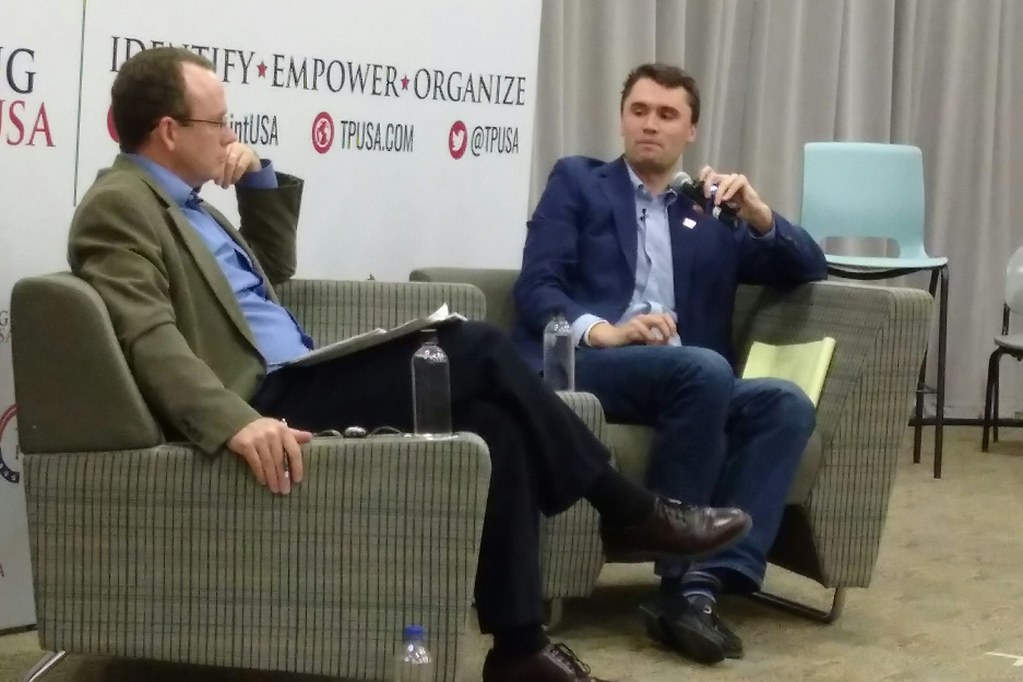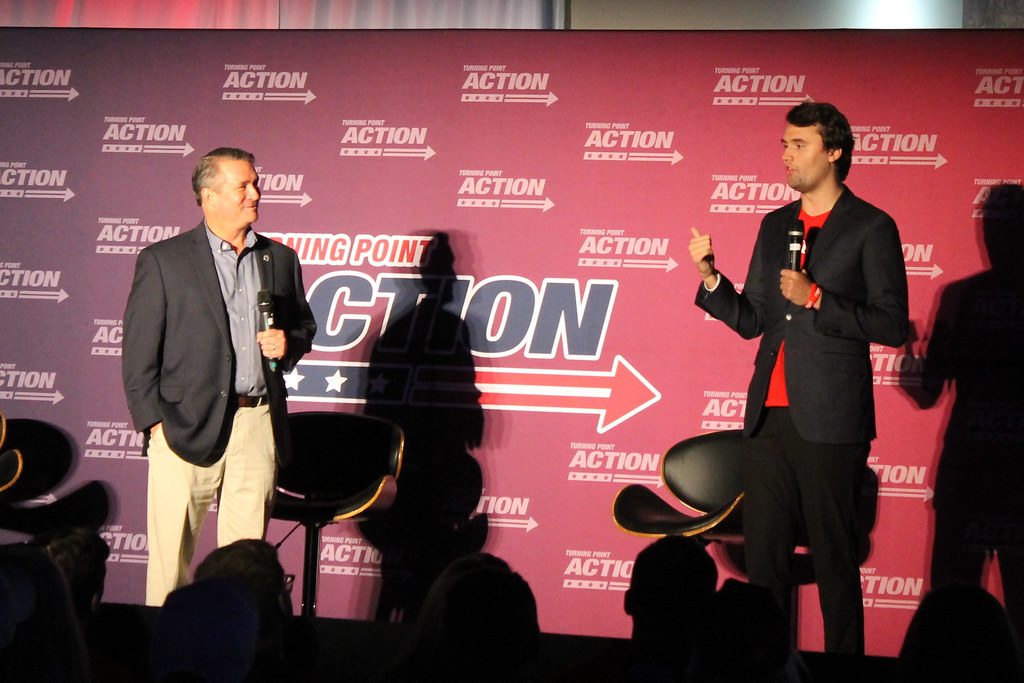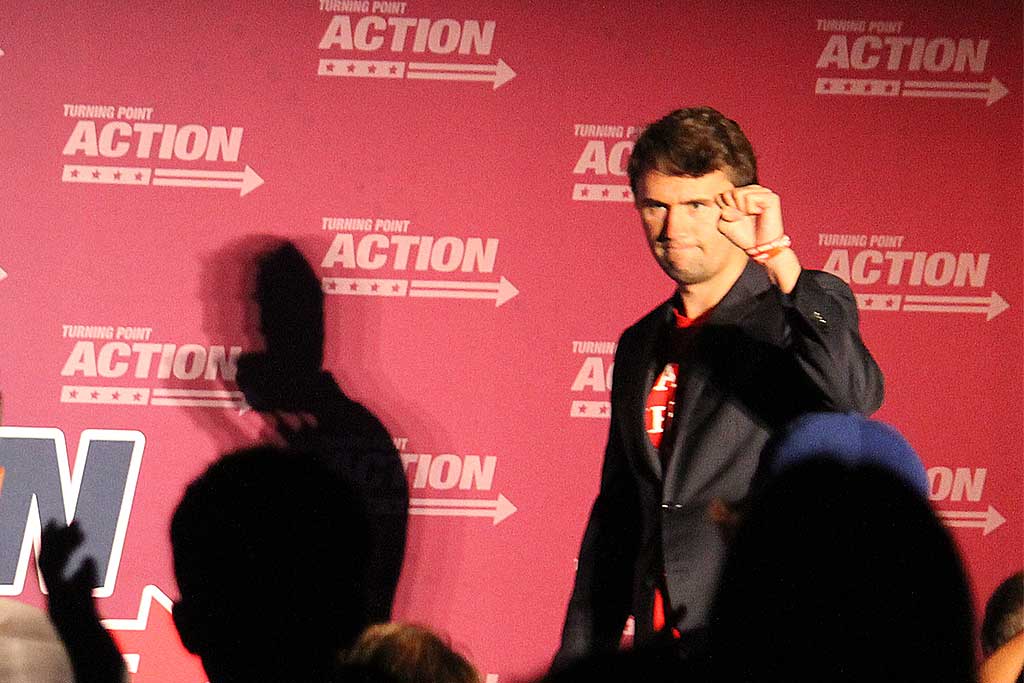Last week, America lost not only a champion of free speech, but a real friend to Omaha conservatives, who worked to bring a message of limited government and personal liberty to young people and the community at large.
College Debates
I first met Charlie Kirk at a debate at Creighton University between him and theology professor Dr. Thomas Kelly. The Creighton chapter of Turning Point USA (TPUSA) had been established amidst tension with faculty. Professor Fidel Fajardo-Acosta, who had been criticized by TPUSA members for a mock anti-Trump extra credit question, called TPUSA a “criminal” organization that “incites hate, violence and racist attacks.”
The audience at Kirk’s event at Creighton was an interesting mix of both conservatives and liberals, including Congressman Don Bacon and his Democratic challenger, Kara Eastman. It was an engaging conversation. Kirk spoke on the compatibility of Christianity and capitalism. He emphasized voluntary charity, individual responsibility, and the successes of free enterprise in reducing poverty. Kelly, from a Catholic Social Thought perspective, argued for an economy rooted in “the common good,” critiquing unregulated capitalism.
During the Q&A, I asked whether it was ethical for the U.S. government to fund abortion providers like Planned Parenthood—even if, due to the Hyde Amendment, those dollars weren’t directly funding abortion procedures. Dr. Thomas Kelly acknowledged that abortion should not be paid for with federal money, but he equivocated. “We also need to argue that maybe that money shouldn’t also create atomic bombs, which, when dropped, kill innocent people,” Kelly said.
Charlie Kirk, on the other hand, was more blunt. “The fact that Planned Parenthood receives $500 million a year of US taxpayer money is immoral and incomprehensible to me,” he said. This was the nature of Charlie Kirk’s campus events: open and honest dialogue, sometimes blunt, but usually civil.


From the Campus to the Campaign Trail
In addition to his engagements on college campuses, Kirk was also an engaged activist for the Republican Party and conservatives in general, and Omaha was a key stop for him on numerous occasions.
Kirk visited Omaha in 2020 during Turning Point Action’s “Four More Tour,” hosting an event with Donald Trump Jr. and Kimberly Guilfoyle ahead of a contentious presidential election. Several hundred guests packed A View on State in West Omaha.
This was a year fraught with conflict, between protests over Covid-19 lockdowns and the death of George Floyd. One guest at the event was a Bellevue East High School junior named Jordan White, and she was immediately bullied with threats of violence after sharing a photo of herself at the event on Instagram.
“I received things like, ‘I should kill myself.’ ‘That I should be jumped.’ ‘Take a video of her getting jumped at school.’ ‘She should be curb-stomped.’ ‘Every Trump supporter should be curb-stomped,'” she told KETV at the time. “If anything, this makes me want to support Trump more because I’m seeing the other side of how they treat others.”
Charlie Kirk returned again in 2024, more engaged than ever with Donald Trump’s third presidential campaign. In April, Kirk held a rally in support of switching Nebraska to a winner-take-all system for its Electoral College votes, drawing a large crowd at Lord of Hosts Church in Millard.
Later that year, Kirk also spoke at a fundraiser for the Speravita Institute, a non-profit organization that provides training and support to pregnancy centers. With two competing abortion amendments on the ballot, the issue was front-of-mind for Nebraska that year.
Kirk spoke specifically on his experience talking with “overly zealous pro-abortion activists” on college campuses as a way of changing hearts and minds on the issue of abortion.
“They think that we pro-lifers cruel and do not care for the women or the babies, and that we have a religious zealotry that we just want to abandon these people into the woods,” Kirk said. “I know that is not true, because I’ve visited these pregnancy crisis centers and organizations like this, and I see how much you care. But we have to do two things. Number one, we do a better job of celebrating, advertising, and bragging on the work of frontline pregnancy crisis centers that are saving babies every single day. The world does not know enough about the great work that is being done. And two, for every time that we talk about the abolition of abortion, we simultaneously couple it with policy ideas, charitable giving, and a tolerant approach of how you will care for people that will be in a place of confusion or a place of uncertainty if a baby is delivered.”
The Future of Free Speech?
Charlie Kirk’s legacy in Omaha runs deeper than many might assume. I was fortunate enough to meet him twice, but I know others who knew him personally. His loss has been felt throughout the city. This is made even more poignant by the many pictures and selfies shared by friends who met him over the years.
We lost a champion of free speech. But his enduring legacy will live on through the people who follow in his stead—carrying forward that tradition of open dialogue and active engagement in advancing the principles of free speech for years to come.




